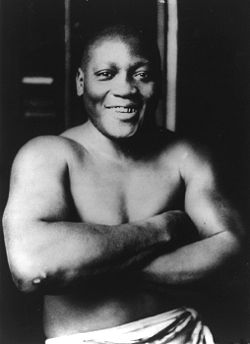Jack Johnson (boxer)
| Jack Johnson | |
|---|---|

Johnson in 1915
|
|
| Statistics | |
| Real name | John Arthur Johnson |
| Nickname(s) | Galveston Giant |
| Rated at | Heavyweight |
| Height | 6 ft 1⁄2 in (184.2 cm) |
| Reach | 74 in (188 cm) |
| Nationality | American |
| Born |
March 31, 1878 Galveston, Texas |
| Died | June 10, 1946 (aged 68) Franklinton, North Carolina |
| Stance | Orthodox |
| Boxing record | |
| Total fights | 104 |
| Wins | 73 |
| Wins by KO | 40 |
| Losses | 13 |
| Draws | 10 |
| No contests | 5 |
John Arthur "Jack" Johnson (March 31, 1878 – June 10, 1946), nicknamed the Galveston Giant was an American boxer, who—at the height of the Jim Crow era—became the first African American world heavyweight boxing champion (1908–1915). Johnson went on to become one of the most dominant champions of his time, and remains a significant historical figure in heavyweight boxing history, with his 1910 fight against James J. Jeffries being dubbed the "fight of the century." Johnson was faced with much controversy when he was charged with violating the Mann Act in 1912, even though there was an obvious lack of evidence and the charge was largely racially based. In a documentary about his life, Ken Burns notes that "for more than thirteen years, Jack Johnson was the most famous and the most notorious African-American on Earth".
Johnson was born the third child of nine, and the first son, of Henry and Tina "Tiny" Johnson, two former slaves who worked blue collar jobs as a janitor and a dishwasher to support their children and put them through school. His father Henry served as a civilian teamster of the Union’s 38th Colored Infantry, and was a role model for his son. As Jack once said, his father was "The most perfect physical specimen that he had ever seen," although his father was only 5 ft 5 in (1.65 m) and left with an atrophied right leg from his service in the war.
Growing up in Galveston, Texas, Johnson attended five years of school and was known as a bright, talkative, and energetic kid. Like all of his siblings, Jack was expected to work to keep the family going while he was growing up. He helped sweep classrooms to ease the work for his father, and he worked for the local milk man before school, taking care of the horses while the milk man got off to make deliveries. For this work he was paid 10 cents and a red pair of socks, which his boss had a seemingly endless supply of, every Saturday.
Although Jack grew up in the South, he said that segregation was not an issue in the somewhat secluded city of Galveston, as everyone living in Galveston’s 12th Ward was poor and went through the same struggles. Johnson remembers growing up with a "gang" of white boys, in which he never felt victimized or excluded. Remembering his childhood, Johnson said, "As I grew up, the white boys were my friends and my pals. I ate with them, played with them and slept at their homes. Their mothers gave me cookies, and I ate at their tables. No one ever taught me that white men were superior to me." Jack carried this mentality to his boxing career, as he would not be intimidated to fight any man, no matter their race.
...
Wikipedia
